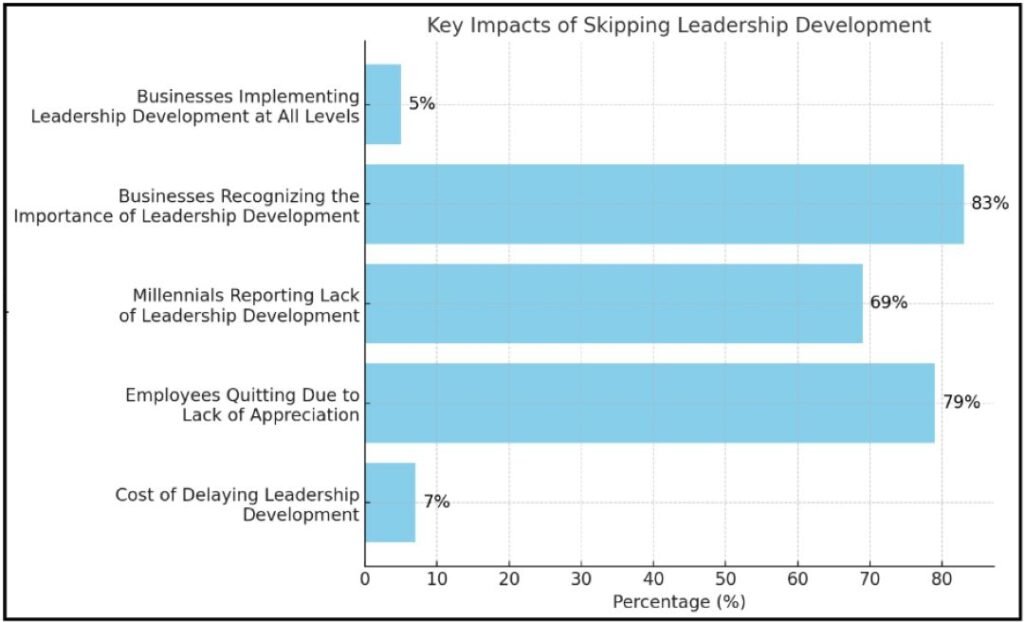What Happens When New Managers Don’t Get the Training They Need?
Leadership training for new managers is essential because stepping into a managerial role involves more than a title change — it’s a shift from doing the work to leading people, requiring strong management skills . First-time managers face new pressures, from higher expectations and decision-making responsibilities to managing relationships with both team members and senior leaders. Without proper guidance, this transition can be overwhelming, making targeted training a critical foundation for long-term success.
Yet most newly appointed managers receive little to no training before taking on these responsibilities. Many feel they need to prove themselves immediately — even though what they truly need is time to learn the new manager skills. That pressure is what often leads to early mistakes (Harvard Business Review).
This guide is here to close that gap by providing a brief overview outlining essential management skills. Whether you’re stepping into your first leadership role or supporting someone who is, you’ll learn:
Why leadership training is essential from day one
The key skills every new manager needs
Practical, modern training approaches that actually work
Real-world examples of what happens when companies get it right — and wrong
Let’s start with the core challenge: Why do so many new managers struggle, even when they’re highly capable?
Why Do Entry-Level Managers Struggle Without Leadership Training?

The move from individual contributor to team leader is one of the most underestimated transitions in a professional’s career. While many new managers are technically skilled, they’re often unprepared for the people-focused demands of the role.
Gaps in Preparation Create Organization-Wide Strain
Success at the management level involves more than technical ability — it requires communication skills, emotional intelligence, conflict resolution, and the ability to manage a team effectively. Yet most newly appointed managers step into the role without formal training, leaving them to rely on instinct rather than strategy.
As a result, new managers commonly struggle with:
Avoiding or mishandling conflict
Micromanaging instead of delegating
Delivering unclear or ineffective feedback
Failing to align teams around shared goals
Feeling isolated or unsure of their leadership identity
Without structured support in team management , even talented professionals can falter — and when they do, the effects ripple through the team, affecting performance, morale, and ultimately, organizational success.
The Challenge of Accidental Managers
Many new managers don’t set out to lead—they’re promoted because of technical expertise or team familiarity, not leadership readiness. These are known as accidental managers—professionals who step into leadership roles without formal training or preparation.
As Schultz (2010) reflects in her transition to a library leadership role, the shift often comes with unexpected responsibilities like scheduling, conflict management, and team development—tasks rarely covered in prior roles. Similarly, Khwaja et al. (2022) found that in higher education, many leaders assume their positions without targeted support, relying instead on personal trial and error.
This lack of preparation can result in avoidable mistakes, from unclear communication to reactive decision-making, ultimately impacting team morale and performance.
Why Training Makes a Measurable Difference
Well-structured leadership training transforms this experience. It gives new managers the tools to lead with confidence, build high-performing teams, and foster a healthier work environment. With the right support, accidental managers can grow into intentional, effective leaders—driving both individual and organizational success.
What Training Should a New Manager Focus On First?

A new leadership role is more than a title—it’s a major shift in responsibilities. Without proper training, new managers often struggle with team dynamics, communication, and execution.
In Becoming the Boss, Linda Hill (HBR) explains that many first-time managers fail because they rely too heavily on technical skills. But leading a team requires a different mindset—one focused on enabling others to succeed.
The First 30 Days — What to Do and What to Avoid
TThe first month is crucial. As Frank Lexa (JACR) notes, it’s a time to build trust and establish credibility or risk long-term setbacks.
What to do:
- Hold one-on-one conversations to build trust
- Learn team strengths and current goals
- Set expectations collaboratively
- Avoid premature changes
- Delegate effectively to support performance
Why Soft Skills Matter More Than Ever
Soft skills aren’t optional—they’re essential. Effective communication, emotional intelligence, and conflict resolution shape how managers lead and how teams respond.
As Baheti, Fessell, and Bhargava (JACR) point out, poor preparation can lead to avoidable missteps. Prioritizing people skills makes all the difference in a successful transition.
Key focus areas:
- Empathetic listening and coaching
- Constructive feedback
- Conflict navigation
- Leading with calm under pressure
What Skills Help New Managers Lead with Clarity and Confidence?

Stepping into leadership means developing essential skills for new managers, such as shifting from “doing” to enabling others to do their best work. But many new managers assume that success still depends on their own output — not realizing that their true value now lies in how well they can guide, support, and empower their team, ultimately engaging employees.
Leadership success isn’t about having all the answers — it’s about asking the right questions, fostering trust, and creating a culture of clarity and accountability. It also depends on one foundational trait: self-confidence.
Why Confidence Matters in First-Time Leadership
Confidence helps new managers lead with clarity and make tough calls without hesitation. Without it, they’re more likely to avoid direct conversations or rely too much on rules and superiors — weakening their authority (Kipnis & Lane, 1962).
Leadership programs have been shown to boost confidence and improve team dynamics. Managers become more open, calm, and communicative — building trust across the board (Söderhjelm et al., 2017).
Effective leadership training is essential for developing the skills and characteristics of an effective manager, fostering a culture of high performance and supporting new managers in their roles.
Confidence isn’t optional — it’s what allows new leaders to show up with presence and lead effectively from day one.
Time and Priority Management
Many new managers feel overwhelmed trying to do it all. But leadership is about setting direction, not doing every task. Training should guide them in aligning priorities with organizational goals, managing their time effectively, and avoiding reactive work habits. Clarity in focus leads to greater team stability and performance.
Delegation and Accountability
Letting go of control is one of the biggest challenges for new managers—but it’s also one of the most important. Effective delegation means assigning tasks based on team members’ strengths, setting clear expectations, and following up without micromanaging.
When done right, delegation boosts team performance and prevents burnout. It also builds trust: studies show that distributing tasks based on competencies strengthens relationships between managers and employees. This trust is the foundation of accountability and long-term success.
Goal Setting and Team Alignment
Without shared goals, even great teams lose focus. New managers must learn how to define success, align efforts with company strategy, and adapt their leadership style to support diverse teams. Tools like SMART goals and OKRs foster accountability, structure, and trust.
Communication, Feedback, and Conflict Resolution
Strong communication underpins effective performance management. New managers should master active listening, timely feedback, and clear decision-making. Poor communication can erode trust and stall collaboration — making this skill set critical to team success (Itri & Lawson, 2016).
Emotional Intelligence and Leadership Presence
Leadership presence is rooted in emotional intelligence — the ability to stay calm, empathize, and respond thoughtfully. These skills not only help managers lead under pressure, but also foster a positive work environment and strengthen company culture.
How Is Technology Transforming Leadership Training for New Managers?

Leadership training is no longer just about books, seminars, and one-size-fits-all workshops. With the rise of Artificial Intelligence (AI), emotional intelligence tools, and immersive platforms, the leadership development landscape is undergoing a major shift — and new managers are at the center of it.
Technological resources, such as AI-driven training programs and mentorship platforms, are critical tools that support new managers in developing their leadership skills and effectively managing their teams.
The Role of AI in Enhancing Leadership Capabilities
Artificial Intelligence is reshaping how leaders operate — and how they are trained. AI tools now assist in analyzing team dynamics, recommending learning paths, and even providing real-time feedback based on communication patterns or productivity metrics.
According to Peifer, Jeske, & Hille (2022), the impact of AI on leadership spans four key areas: strategic transformation, competency development, cultural alignment, and human-AI interaction. This means training for current managers can no longer be generic — it must adapt to real-time data, individual behaviors, and organizational contexts.
As Titareva (2021) outlines, one of the most promising views is the enhancement perspective — where AI serves as a partner, not a replacement. AI tools handle repetitive admin work, freeing up leaders to focus on coaching, visioning, and innovation. However, this shift also requires managers to develop new competencies in data literacy, tech ethics, and algorithmic decision-making, all essential manager skills for leading in the digital age.
Why Emotional Intelligence Still Matters
AI may excel at data and predictions, but it lacks emotional nuance. That’s why emotional intelligence (EI)—the ability to understand and manage emotions—remains vital for leaders, especially new managers navigating team dynamics.
Recognizing one’s leadership style is a key part of developing EI, which improves team communication and effectiveness.
EI and AI aren’t in competition. As Vivek & Krupskyi (2024) found, combining both leads to better decisions, stronger communication, and improved team performance. Future-ready leaders know how to interpret data and connect with people.
Preparing for Human-AI Collaboration
New managers shouldn’t fear AI—they should learn to work with it. That means understanding AI’s limits, questioning its outputs, and applying insights in human-centered ways.
As Smith & Green (2018) note, today’s leaders must act as interpreters and ethical stewards of AI systems. This requires tech literacy, critical thinking, and strong communication—skills that are just as important when managing experienced teams.
What This Means for Training Programs
Modern leadership training for new managers programs must go beyond traditional management principles. They need to prepare new managers to:
Use AI for personalized learning and performance support
Balance data-driven insights with emotional intelligence
Lead hybrid teams that include both people and digital tools
Make ethical decisions in an automated environment
Providing practical and actionable techniques in training programs is crucial to ensure that new managers gain confidence and can immediately apply what they learn.
Training, including manager courses, is no longer just about learning to lead — it’s about learning how leadership itself is changing.
What Happens When Companies Skip Leadership Development?
Leadership development is essential for building a productive, engaged workforce. Without it, organizations face costly setbacks. New managers need core skills like self-awareness, communication, and influence to lead effectively. Here are key stats that show the impact of skipping leadership training:
Key Impact of Skipping Leadership Development

https://www.zippia.com/advice/leadership-statistics/
The bar graph highlights the critical consequences of neglecting leadership development in organizations:
7% of annual sales are lost each year companies delay leadership development.
79% of employees are thinking of leaving or will leave due to a lack of appreciation, which often results from poor leadership.
69% of millennials feel leadership development opportunities are insufficient, signaling a gap in growth opportunities for younger workers.
83% of businesses recognize the importance of leadership development, but only 5% have implemented it across all levels, indicating a significant gap between awareness and action.
These statistics emphasize the need for organizations to prioritize leadership development to enhance performance, reduce turnover, and secure long-term success.
By not investing in leadership development, companies are missing out on increased revenue, higher employee retention, and better team engagement. These statistics underscore the importance of investing in leadership training for long-term success.
How Do High-Performing Companies Train Their First-Time Managers?
For industry leaders, developing first-time managers is a strategic priority. Companies that outperform their competitors understand that early leadership training directly impacts performance, retention, innovation, and cultural stability.
Developing new skills is crucial for first-time managers as they transition into leadership roles, helping them overcome challenges and self-doubt.
According to data from the Global Leadership Forecast 2025, organizations investing in structured leadership development programs report significant business improvements:

Real-World Examples of Leadership Growth in Action
The statistics are compelling, but what does this look like in practice? Here are three globally recognized companies that have seen remarkable results by investing in their leaders:
General Electric (GE): Under Jack Welch, GE set the global standard for leadership excellence. Through programs like Work-Out, GE empowered employees to lead confidently, tripling the company’s market value and creating future CEOs across industries.
Google (Alphabet): Google’s commitment to leadership development helped Sundar Pichai rise from product manager to CEO. Their focus on feedback, mentorship, and innovation ensures that new managers have the tools needed for success.
General Motors (GM): Mary Barra’s path from intern to CEO is a testament to GM’s dedication to leadership growth. The company’s investment in leadership training programs and mentorship has helped foster leadership at all levels.
Frequently Asked Questions About First-Time Leadership Training
Here are a few common questions companies often ask when shaping their manager training strat
Can leadership be taught?
Yes. Leadership is a skill, not just a trait. With training, feedback, and practice, new managers can develop the core competencies needed to lead effectively.
What happens if new managers skip training?
They often struggle with communication, delegation, and decision-making. This can lower morale, hurt productivity, and increase turnover.
How long should training last?
There’s no one-size-fits-all. The best programs are ongoing—combining real-world application, peer learning, and coaching.
What skills are most important for first-time leaders?
Emotional intelligence, time management, feedback, and goal-setting top the list. These soft skills directly impact team performance and engagement.
Supporting Leadership Growth at Every Level

Leadership development doesn’t stop at a promotion — it’s a continuous process that evolves with your organization’s needs. To build a resilient leadership pipeline, companies must support their first-time managers not just at the moment of transition, but throughout their journey. This means offering relevant leadership training, reinforcing it with coaching, and making leadership growth a shared responsibility across all levels. Developing capabilities for new leadership roles is crucial to address the challenges faced by emerging leaders and ensure they have the necessary mindset shifts to succeed

A trailblazer in humanising leadership and building high-resilience teams. As a former United Nations Peacekeeper, he leverages his high-stakes experience to redefine leadership dynamics. With a career distinguished by numerous accolades, Joseph now helps organizations thrive through a human-centric approach, enhancing performance, productivity, and workplace culture.






